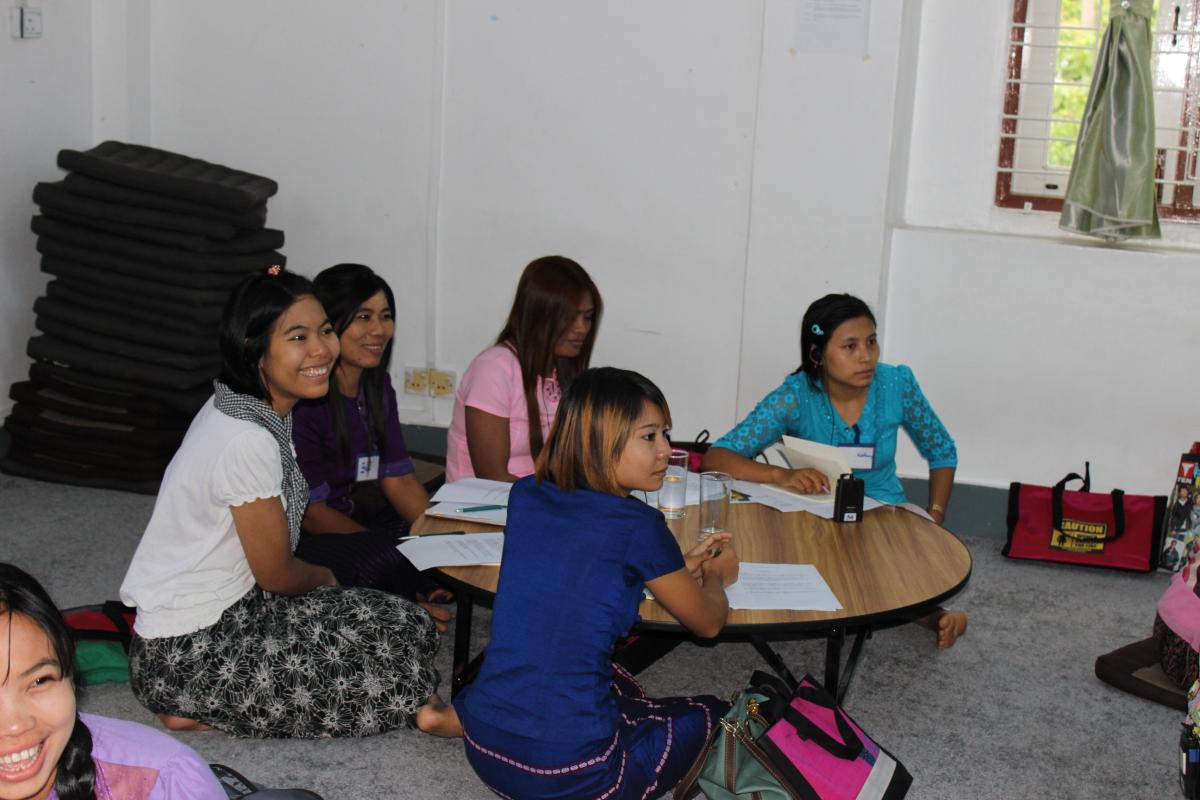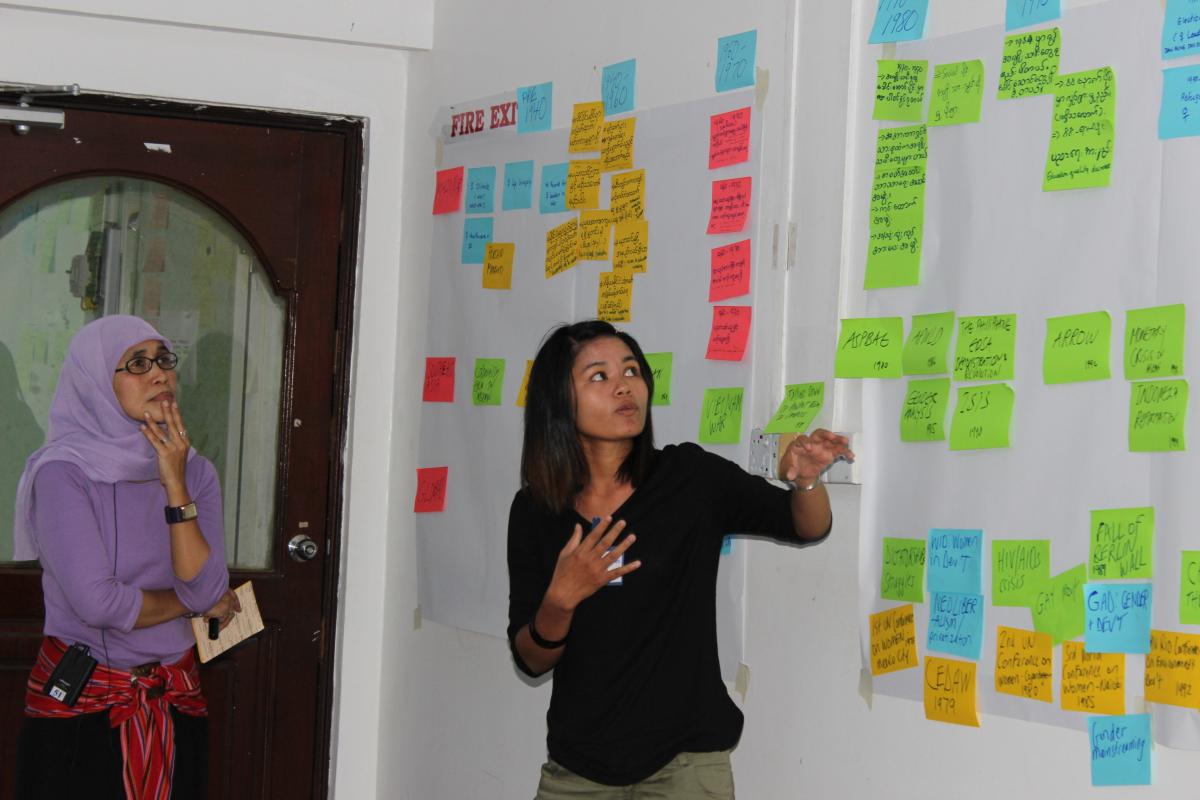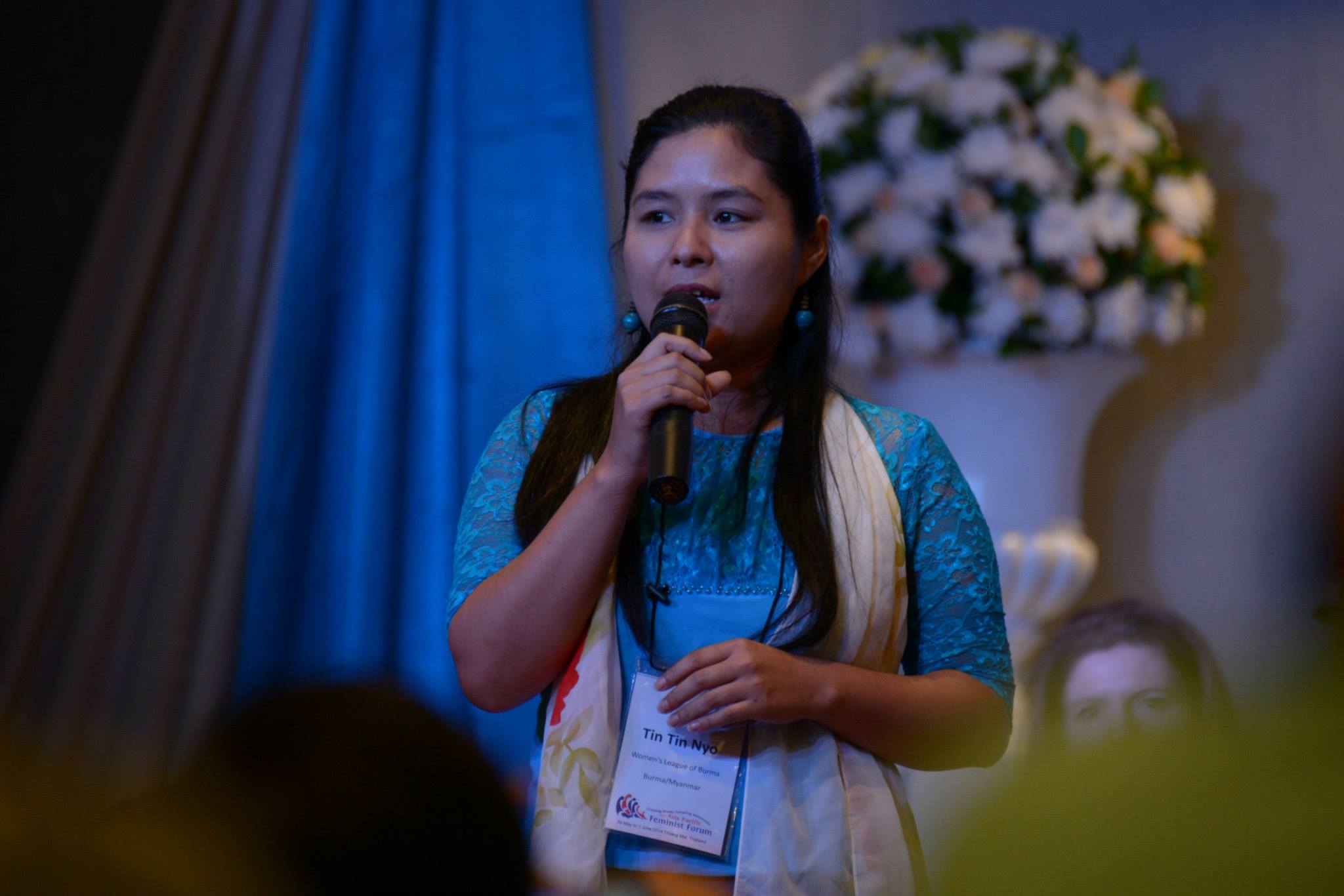Women’s groups in Myanmar have come together to challenge the proposed Inter-faith Marriage Law, which would restrict Buddhist women from marrying people of other religions and in practice, ethnicities. Not only would the looming legislation limit women’s freedoms, but the groups argue that it would further sanction ethnic discrimination against the Muslim minority in Buddhist-majority Myanmar, who face increased violence and hate since country’s transition from military rule in 2011. During a recent workshop convened by JASS Southeast Asia, courageous activists leading these efforts explained how they have been called “whores” and are threatened with violence to silence their vocal opposition. Despite the risks, they have mobilized more than 160 women’s and human rights groups to sign a joint statement and more recently, with support from JASS and the Nobel Women’s Initiative, are aiming for more global solidarity and visibility.
In a show of energized and united activism, women across Myanmar are coming together to campaign against a proposed bill restricting inter-faith marriage. If passed, Buddhist women would have to get permission from their parents and government officials before marrying men from other faiths, and in practice, other ethinicities. It also calls for a 10-year prison sentence for non-Buddhist men who marry a Buddhist without converting to Buddhism. In addition to sanctioning ethnic discrimination and fanning ethnic hatred, this bill—ostensibly meant to “protect” Buddhist women—would reinforce women’s secondary status in the family and further restrict basic personal rights and freedoms. “In a press conference, one of the monks said in support of the law, ‘Women need protection because they have no brains’,” says Htar Htar, Director of AKHAYA Women Myanmar. She adds, “… this is not about religion. This law is a violation of human rights.”
The Influence of the Buddhist National Movement
The draft law is one among four bills that have been proposed by the government at the request of the Organization for the Protection of Race, Religion and Belief—a coalition of nationalist monks with outsized political and social influence—plays the unofficial role of “protecting the national race and religion” in Myanmar. The coalition’s formal recommendations to the government are bolstered by a petition with more than 1 million signatures in support of the bills. Other proposed legislation includes a law banning polygamy and another limiting family size, both of which are argued to be targeting the Muslim population.
“This law is not about religion. It is a violation of human rights,” ~ Htar Htar, AKHAYA Women Myanmar
The powerful force behind them is a Buddhist national movement known as 969. Led by Ashin Wirathu, the 969 movement gained influence in 2012, and has since been encouraging the discrimination of Muslims by boycotting their businesses and shunning interfaith marriages, thus inciting tension and violence between Muslims and Buddhists. For example in 2012, over 100 people were killed and thousands displaced during the Rakhine state riots. Described by the Straits Times as a, “neo-nazi group“, they not only have the ear of the government, but also have a growing grassroots following, mobilized by fueling anti-Muslim intolerance and religious and ethnic tensions. Says Htar Htar, “The 969 movement is very strong. They say they have the responsibility to protect. Over the past years, they laid the foundation for this and plotted strategies of how to accomplish this by using lots of hate speech.” The 969 movement has capitalized on its notable influence on public opinion and cultural beliefs to lead a one-sided education campaign on the inter-faith marriage law and other discriminatory measures to consolidate its own political power.
Women Mobilizing Opposition and Educating Communities
Despite the odds, women are coming together to organize against this law and stand up for gender and ethnic equality and inclusion. The goal as Htar puts it is to, “Educate people and initiate discus sions on this law and on its potential consequences and long-term impact so that they decide for themselves, and not from propaganda.”
sions on this law and on its potential consequences and long-term impact so that they decide for themselves, and not from propaganda.”
More than 160 women’s groups and civil society organizations in Myanmar, including groups from the long-standing network, Women’s League of Burma (WLB) outside of Myanmar have come together to mobilize a united, high profile counter-effort to stop the law, including issuing a joint statement and launching an online petition aimed at garnering international support. JASS also worked with Nobel Women’s Initiative to produce a statement in support of women’s groups’ efforts against this law.
Given the powerful role Buddhist monks play in changing hearts and minds, women activists are astutely joining forces with prominent monks who oppose the law. “We are starting to make allies with other monks. They realize that this is not a religious issue, it is political. Some Buddhist monks are not openly opposing this law yet but they are now starting to address this within their groups,” says Htar.
Women’s advocacy against this law has generated backlash. “In their official statements after we released our statements opposing this bill, they called us national traitors because we didn’t agree with their aim to “protect religion,” says Htar Htar. She explained that a few of the women got death threats and added, “They sexually harass us on facebook,” adds Htar Htar.
The women’s movement in Mynmar is just beginning to coalesce. As Htar says, “The women’s movement in Myanmar has just started. This law has created a space and opportunity for us to become united and to pull our strength together.”
JASS Movement-building Initiative in Myanmar
 Following an initial series of dialogues and workshops to build relationships and carry out an assessment between 2009 and 2012, JASS Southeast Asia kicked off a long-term training and movement-support initiative, to contribute to stronger grassroots organizing and leadership linked to advocacy by diverse women in different organizations and regions across Myanmar. With a multi-generational training team of women from Zimbabwe, Indonesia, Cambodia and Canada, the women participating took note of the example of inclusion, representation and diversity. As Mai Sui, Myanmar activist commented, “At the start of the training, I noticed that the people from JASS organization are different—costume, color and behavior. You four are totally different. I see that your background, countries and customs must be different and also the belief system might be different but I see that you can all work together. So I want to know—which practice is pushing you to work together?“
Following an initial series of dialogues and workshops to build relationships and carry out an assessment between 2009 and 2012, JASS Southeast Asia kicked off a long-term training and movement-support initiative, to contribute to stronger grassroots organizing and leadership linked to advocacy by diverse women in different organizations and regions across Myanmar. With a multi-generational training team of women from Zimbabwe, Indonesia, Cambodia and Canada, the women participating took note of the example of inclusion, representation and diversity. As Mai Sui, Myanmar activist commented, “At the start of the training, I noticed that the people from JASS organization are different—costume, color and behavior. You four are totally different. I see that your background, countries and customs must be different and also the belief system might be different but I see that you can all work together. So I want to know—which practice is pushing you to work together?“
Photo credit: APWLD


























